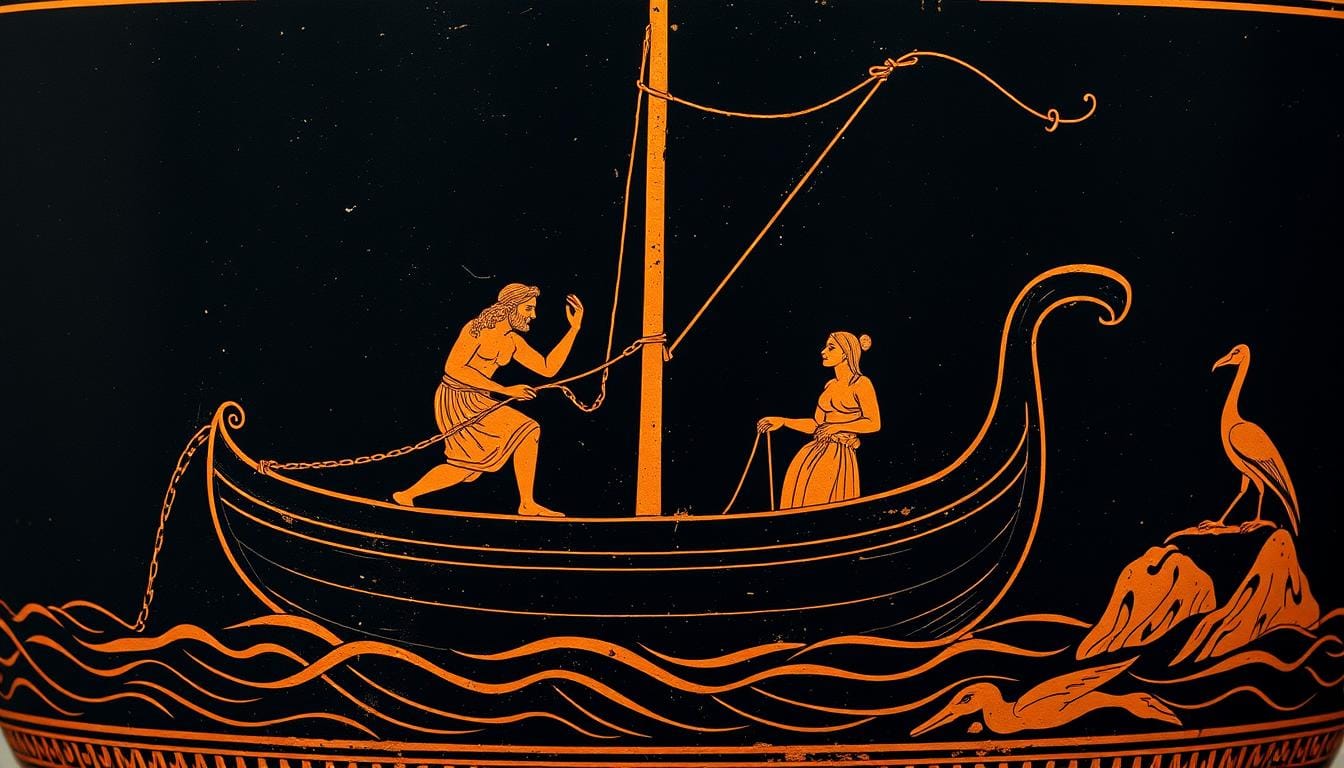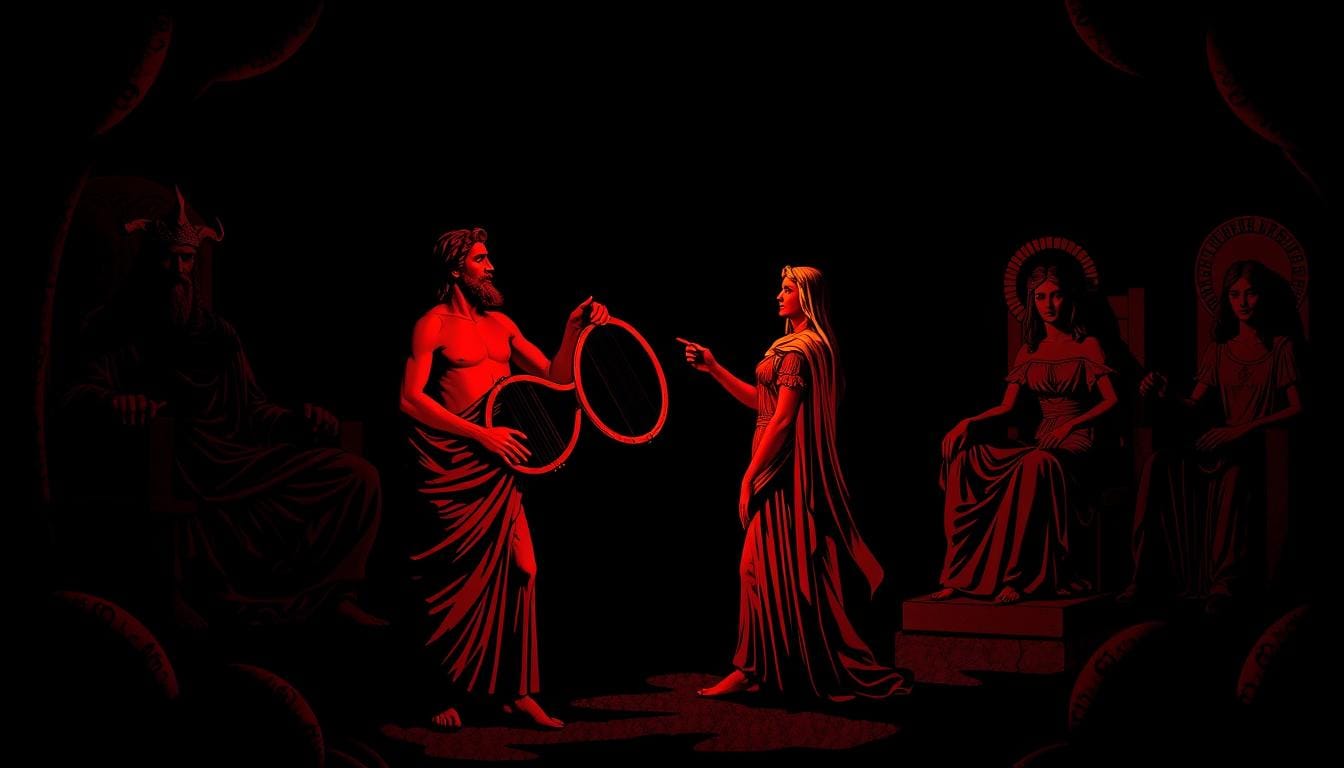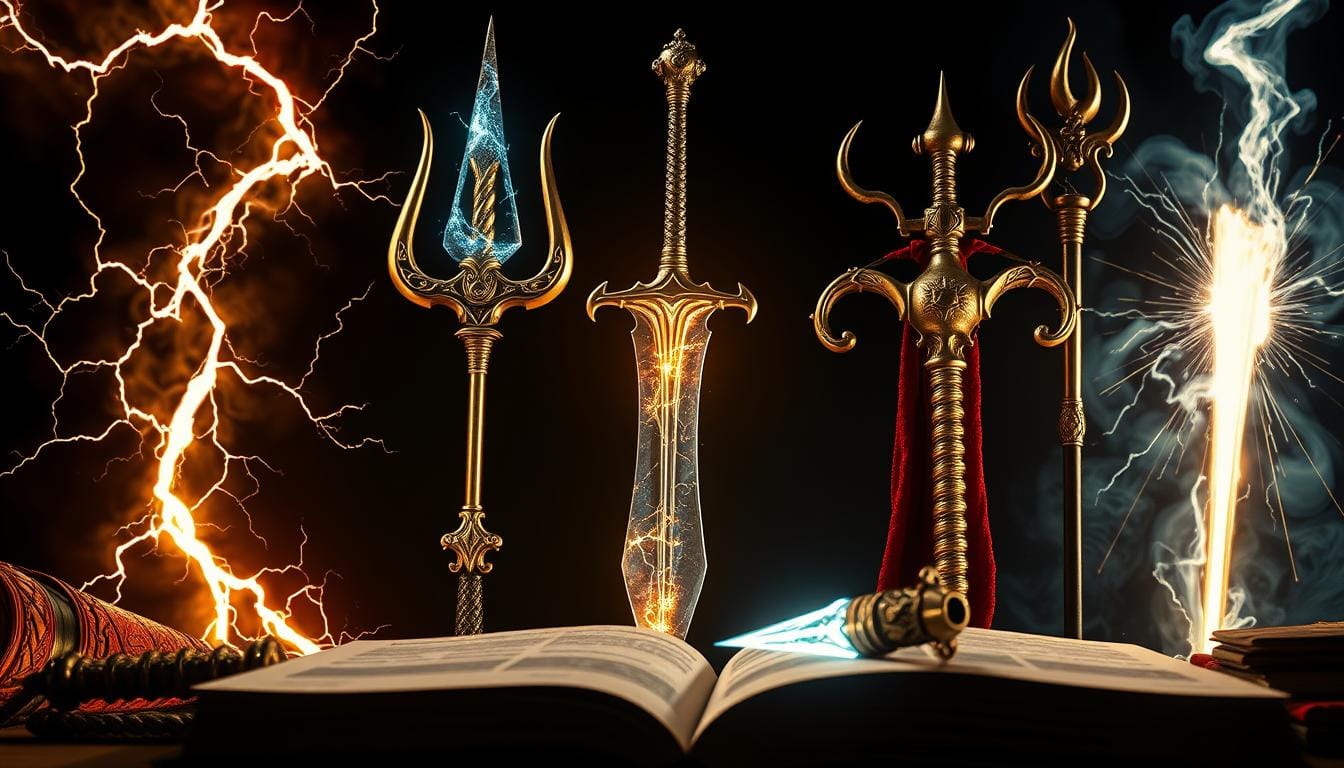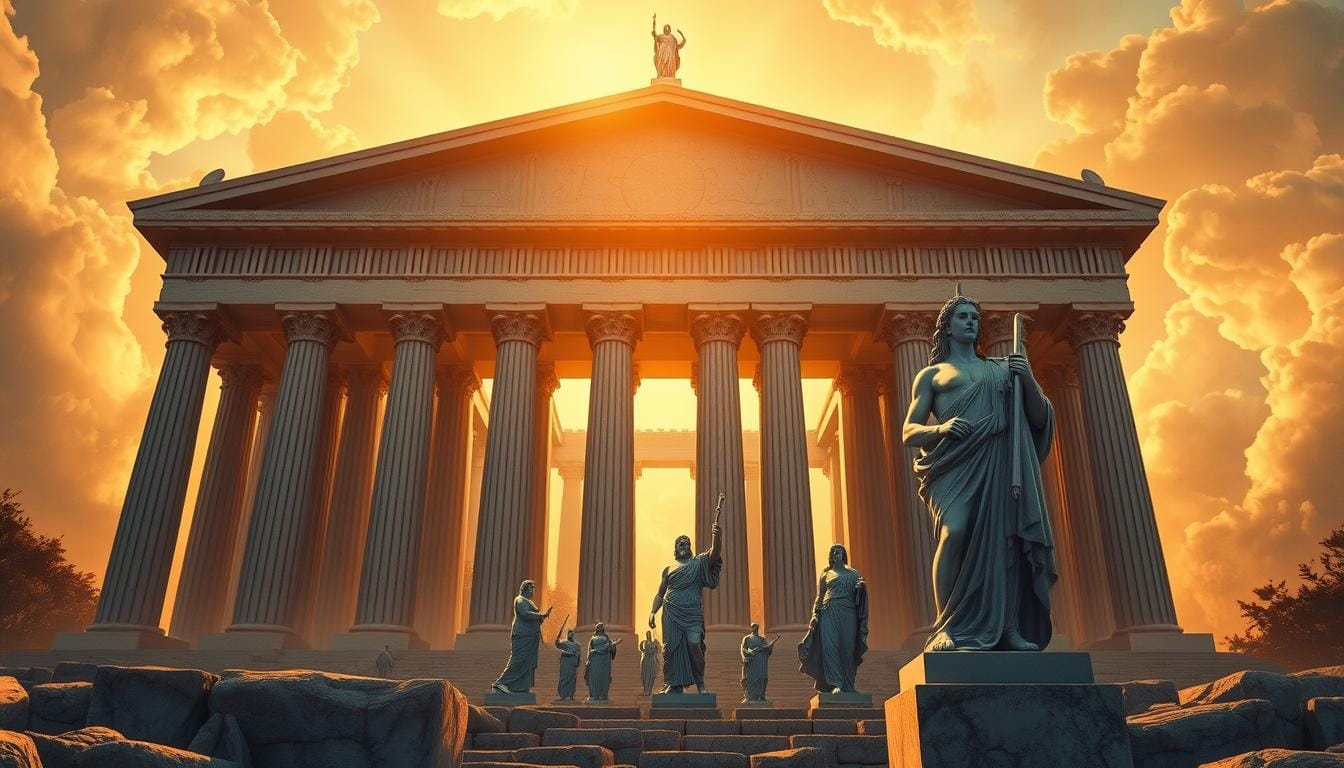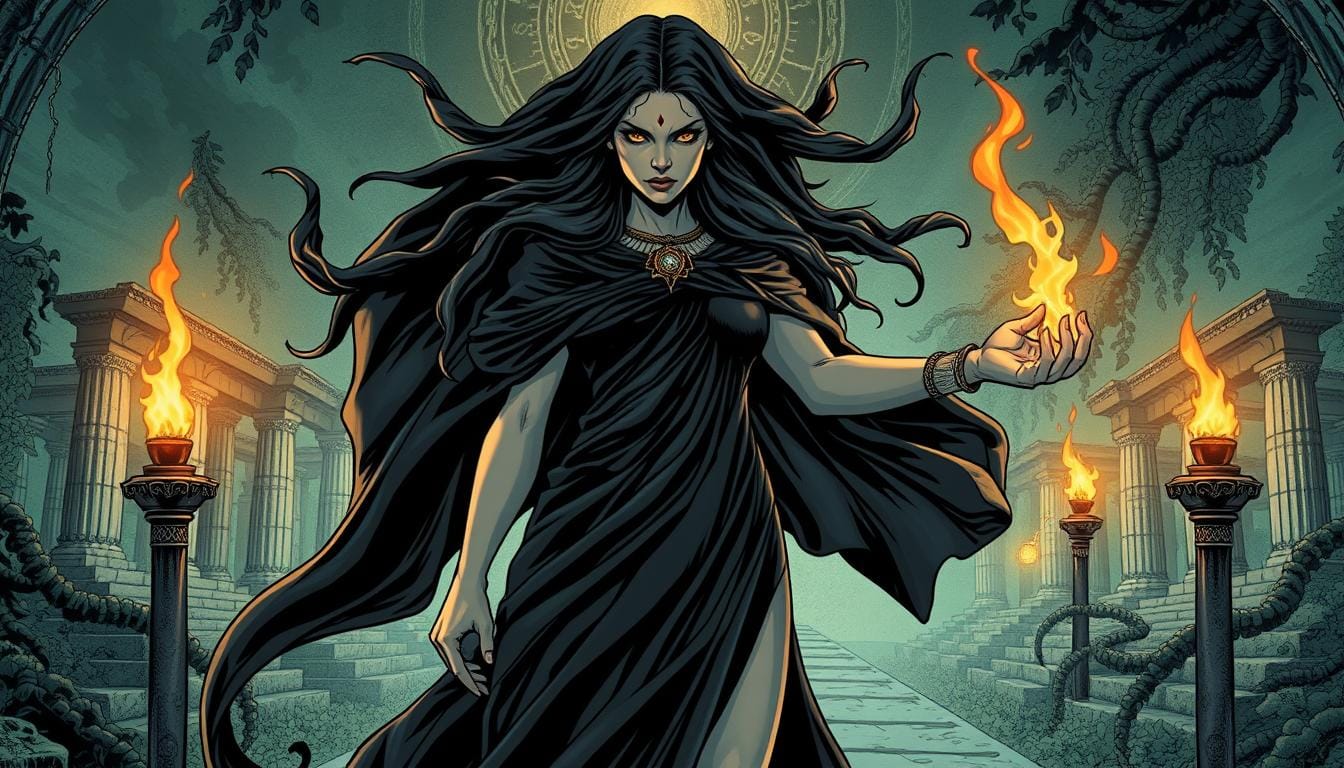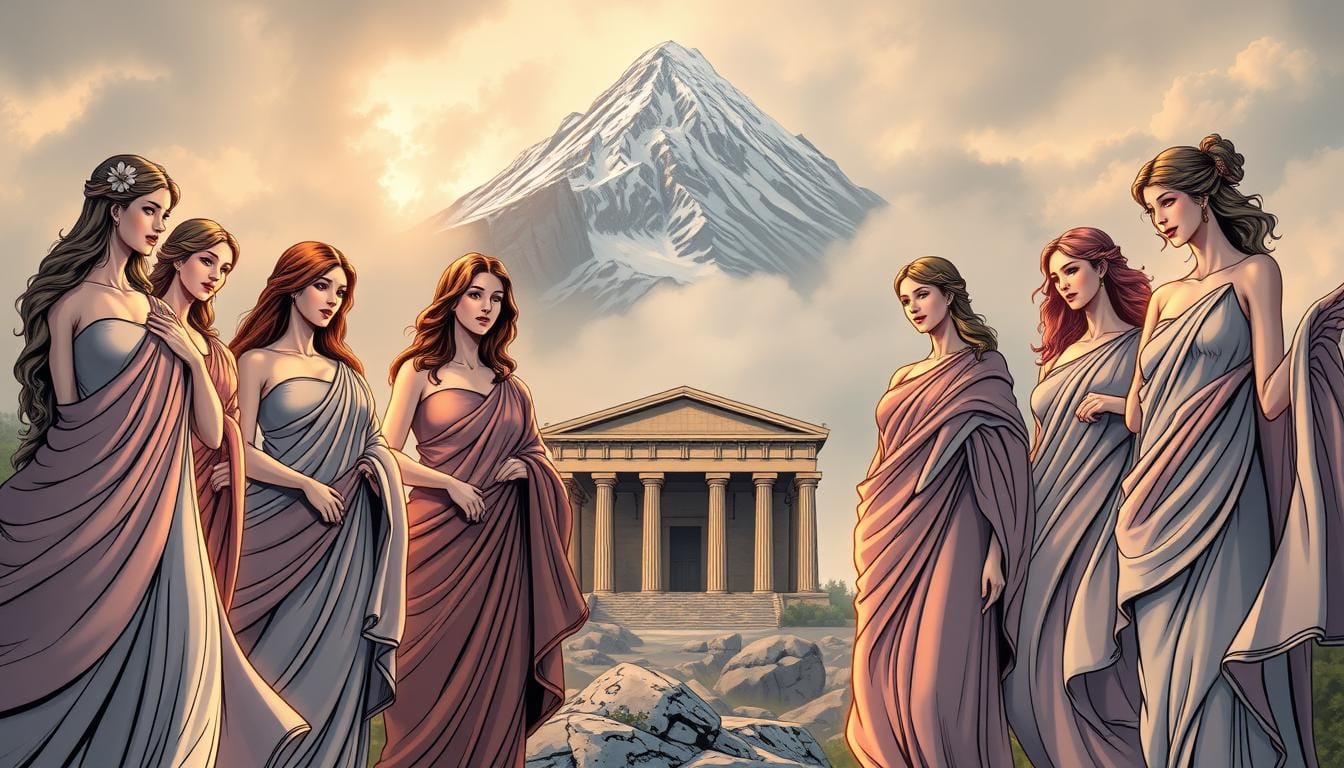Have you ever felt a deep connection in an ancient temple? Exploring sites dedicated to Apollo can be deeply moving. This olympian sun deity left a lasting impact on Greek culture.
Walking in Greece, you follow the path of those who sought wisdom from Apollo. He was all about prophecy, healing, and creativity. His power was both beautiful and powerful.
Visiting Delphi or Delos? Knowing Apollo’s story makes your trip even more special. His temples were more than just buildings. They were places where people felt the divine.
We encourage you to learn more about this apollo god of light music and prophecy. See how he lights the way for those seeking true Greek experiences.
Key Takeaways
- Apollo was a multifaceted Olympian deity governing prophecy, music, healing, and divine illumination
- His most famous oracle site at Delphi remains one of Greece’s most visited archaeological treasures
- The island of Delos, his legendary birthplace, offers travelers a unique mythological experience
- Apollo’s influence extended beyond religion into art, medicine, and cultural ideals of ancient Greece
- Modern visitors can explore numerous temples and sacred sites dedicated to this powerful deity
- Understanding Apollo’s story enhances appreciation for Greek cultural foundations and Western civilization
The Divine Origins and Mythological Background of Apollo
Apollo’s divine heritage is rooted in a fascinating origin story. It’s a tale of divine politics and family drama. This story shaped the destiny of one of the most revered gods in ancient times.
Zeus had a passionate affair with Leto, a beautiful Titaness. Her pregnancy sparked a dramatic pursuit by Hera. Hera was so jealous that she forbade any land from giving Leto shelter.
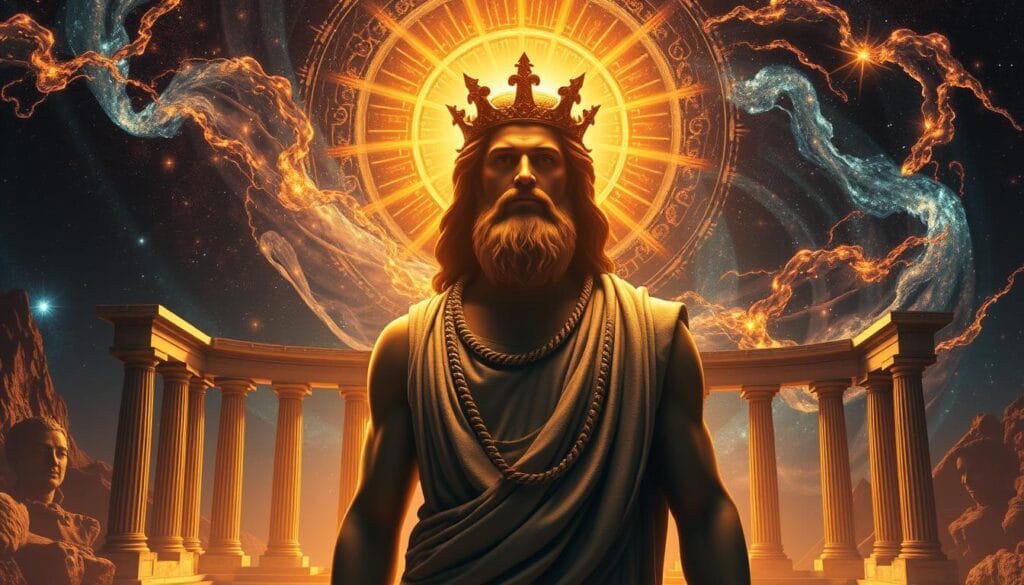
Birth on Delos and Early Divine Manifestations
The floating island of Delos became Leto’s sanctuary. Here, the greek deity of healing was born. Homer tells us that Leto wandered, seeking refuge as her time approached.
Delos, a barren island, defied Hera’s decree. Leto gave birth to apollo twin of artemis under a sacred palm tree. The island stabilized, becoming forever sacred.
At birth, Apollo showed his divine nature. He was fed ambrosia and nectar by Themis. Instead of crying, he demanded a golden lyre and silver bow, ready to reveal Zeus’s will.
| Divine Manifestation | Symbolic Meaning | Future Domain | Immediate Impact |
|---|---|---|---|
| Demanding the Golden Lyre | Musical mastery and harmony | God of Music and Arts | Established artistic authority |
| Requesting Silver Bow | Power over life and death | Healing and Plague | Demonstrated divine weaponry |
| Prophetic Declaration | Divine communication | Oracle and Prophecy | Connected to Zeus’s will |
| Immediate Speech | Wisdom beyond age | Divine Knowledge | Showed supernatural intelligence |
Ascension to Mount Olympus
Apollo’s journey to Mount Olympus was more than a physical move. It marked his transformation into a recognized deity. Within days, he amazed the Olympians with his powers.
His first act was to slay the dragon Python, who tormented his mother. This act showed Apollo’s role as a protector and bringer of order. The slaying at Delphi became a celebrated myth.
Zeus welcomed Apollo with pride, seeing his unique talents. The king of gods recognized Apollo’s balance of creativity and power. This balance was key for harmony between gods and mortals.
Establishment as a Major Olympian Deity
Apollo quickly rose to prominence among the twelve Olympian deities. His diverse nature allowed him to fill several important roles. These roles had previously been scattered among lesser gods and spirits.
His rise is seen in the rapid construction of temples and shrines. Delos became a major pilgrimage site, honoring Apollo’s birthplace. The island’s transformation shows Apollo’s immediate impact on ancient religion.
Apollo’s divine portfolio included light, music, prophecy, and healing. He became one of the most versatile and accessible gods. Unlike some Olympians, Apollo bridged the gap between divine power and human aspirations.
The establishment of his oracular shrine at Delphi solidified his status. The Pythia delivered his prophecies to mortals. This made Apollo a primary channel for Zeus’s will, elevating him to great reverence.
Sacred Symbols and Divine Attributes
Apollo’s divine attributes are fascinating. Each symbol tells a story about his powers and experiences. These symbols were more than decorations; they were powerful representations for the ancient Greeks.
Apollo’s symbols connected the divine and mortal worlds. His attributes showed his full divine nature, from inspiring art to being deadly precise, and from healing to prophetic wisdom.
The Golden Lyre and Musical Instruments
The golden lyre is Apollo’s most famous symbol. It shows his role as the ancient greek music patron. The lyre’s story starts with divine mischief and ends with musical mastery.
Hermes made the first lyre from a tortoise shell as a young god. He stole Apollo’s cattle and gave the lyre as a gift. Apollo loved the lyre’s sound and accepted it.
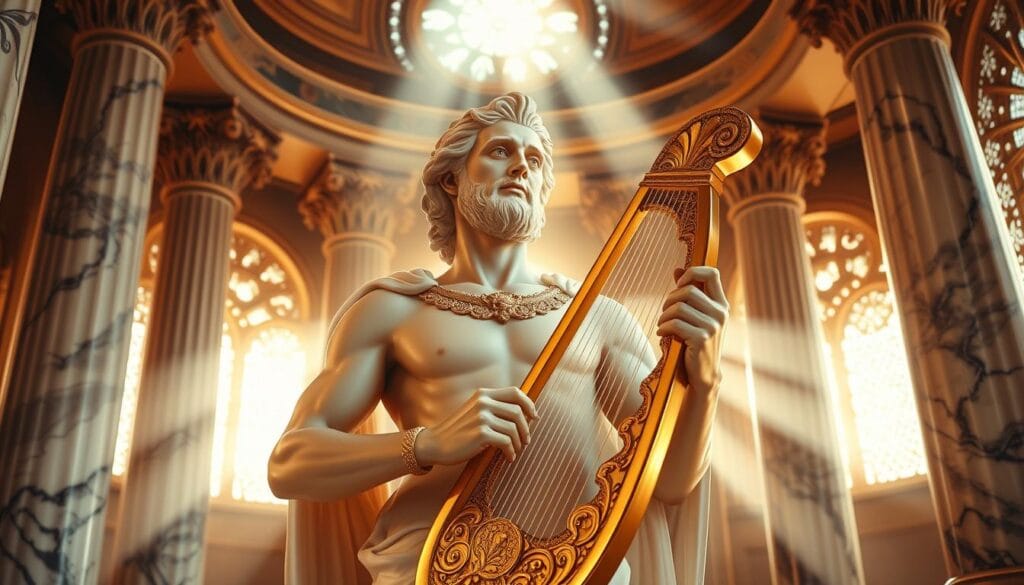
After that, the lyre was always with Apollo. Musicians and poets in ancient Greece looked to him for inspiration. The lyre symbolized divine harmony and music’s power to move gods and mortals.
“Apollo’s lyre could charm wild beasts, move stones, and bring peace to troubled hearts with its celestial melodies.”
The Silver Bow and Arrows of Plague and Healing
Apollo’s silver bow shows his dual nature. The Cyclopes made this weapon, with arrows that could bring plague or healing. This apollo archery divinity showed his control over life and death.
The silver arrows had different powers. When angry, they could bring disease and death. Homer’s Iliad tells of Apollo’s wrath raining plague arrows on the Greek army.
But these arrows could also heal. Apollo’s medical knowledge made him a patron of healers. His bow symbolized the line between destruction and salvation.
The Laurel Crown, Python, and Sacred Animals
The laurel crown is special in Apollo’s story, from a tale of love and transformation. Daphne became a laurel tree to escape Apollo. Heartbroken but respectful, Apollo made the laurel tree sacred.
Laurel wreaths symbolized victory, honor, and achievement in Greek culture. Winners of the Olympics and poets received these crowns. Apollo’s connection to laurel started a tradition that lasts today.
The Python was Apollo’s victory over chaos and his role as an oracular deity. After defeating this massive serpent at Delphi, Apollo claimed the site and founded his oracle. This victory showed order conquering chaos.
| Sacred Symbol | Divine Meaning | Cultural Impact | Modern Legacy |
|---|---|---|---|
| Golden Lyre | Musical mastery and artistic inspiration | Patron of musicians and poets | Symbol of classical music |
| Silver Bow | Power over plague and healing | Medical patronage and warfare | Medical caduceus symbolism |
| Laurel Crown | Victory and honor | Olympic and poetic recognition | Academic achievement symbols |
| Sacred Animals | Divine messengers and omens | Prophetic interpretation | Wildlife conservation awareness |
Apollo’s animals had special meanings. Dolphins showed his connection to sea travel and protection of sailors. Ravens were messengers and symbols of prophecy, appearing before important oracles.
Swans represented Apollo’s musical and poetic sides. These elegant birds sang beautifully just before death, linking them to beauty and the transition between life and death.
These symbols created a language that showed Apollo’s complex nature to ancient worshippers. Each attribute highlighted different parts of his divine nature, yet kept his identity as one of Greece’s most beloved deities.
Apollo God of Light Music and Prophecy: Primary Domains and Powers
Apollo was a highly respected god in ancient Greece. His influence covered four main areas that touched human life deeply. These powers made Apollo god of light music and prophecy key in both divine and human affairs.
Apollo had both creative and destructive powers. He could heal or send plagues, inspire music or punish the wicked. This showed the Greek view that divine power can be both good and bad.
Solar Deity and Light Bringer
Apollo was deeply connected to light and the sun. He was often shown driving the sun’s chariot, bringing light and warmth. But, the helios solar association was complex in Greek myths.
At times, Apollo was seen as different from Helios, the sun god. Yet, both brought light to humans. Apollo’s light also stood for intellectual and spiritual enlightenment.
His light symbolized truth, knowledge, and wisdom. Greeks believed Apollo’s light could clear darkness from the world and souls. This made him a guide for those seeking understanding.
Divine Patron of Music and Artistic Inspiration
In music, Apollo was the supreme divine patron. His golden lyre created melodies that could enchant gods and mortals. He led the nine Muses in heavenly concerts, setting the standard for all music.
Apollo inspired many musicians, poets, and artists. His influence shaped Greek culture and art. Musicians would pray to Apollo for his blessing before performances.
His musical contests were famous. Apollo challenged gods and mortals, showing his unmatched artistic skill. These contests solidified his role as the ultimate creative authority.
Master of Prophecy and Oracular Wisdom
Apollo oracular powers made him a bridge between gods and humans. Through his oracle at Delphi, he gave prophecies that shaped decisions. He was the most consulted deity in ancient times.
His prophecies were not just about fortune-telling. Apollo’s oracles offered wisdom on politics, war, and personal issues. Kings and commoners sought his guidance through rituals and offerings.
The apollo oracular powers worked through chosen priestesses called Pythias. These women would enter trance states to receive Apollo’s messages. Their cryptic words added to Apollo’s mysterious and revered prophetic domain.
Healing Arts and Disease Control
Apollo was also a master of healing arts. He could send diseases as punishment or cure those who honored him. This made him both feared and respected.
Ancient Greeks believed Apollo could unleash plagues on communities that displeased him. His silver arrows carried disease and death to the wicked. Yet, he could also protect the righteous.
His healing powers also protected flocks and cattle, important to farmers. Shepherds and farmers offered sacrifices to Apollo for his protection. This connection linked him to human survival and prosperity.
Sacred Temples, Worship Sites, and Religious Cults
Sacred temples dedicated to Apollo were key centers of worship and prophecy in ancient Greece. These sites drew pilgrims from all over the Mediterranean. Each temple offered unique experiences that connected mortals with Apollo’s divine realm.
We encourage modern travelers to explore these sites. They give us a glimpse into ancient religious practices and architectural achievements that shaped Western civilization.
The Great Temple at Delphi
The Temple of Apollo at Delphi is a masterpiece of ancient Greek architecture. It sits dramatically on Mount Parnassus. This sanctuary was more than a worship site; it was a pan-Hellenic meeting place for Greeks seeking divine guidance.
The delphic oracle apollo connection made this temple famous. The Pythia delivered prophecies here that influenced major decisions and military campaigns. Her cryptic messages shaped Greek history for over a thousand years.
The temple complex had many remarkable features:
- Treasuries built by various Greek cities to store offerings
- A magnificent theater with perfect acoustics
- A stadium for athletic competitions
- Sacred springs and ritual purification areas
Today, visitors can experience the theater’s acoustic perfection. The site’s atmosphere is almost mystical. It helps us understand why ancient Greeks considered it the center of their world.
The Sacred Island of Delos
Delos is Apollo’s birthplace and a key archaeological site in Greece. This small island in the Cyclades was the center of the Delian League and a major religious hub for centuries.
The island has remarkable preserved structures that showcase ancient Greek religious architecture. The famous Terrace of the Lions guards the sacred lake where Leto gave birth to Apollo and Artemis. Multiple temples dedicated to Apollo dot the landscape, each telling part of his divine story.
Delos is special for travelers because of its incredible preservation. The entire island is an open-air museum where visitors can walk through ancient streets and explore intact religious complexes. No modern development has disturbed these sacred grounds.
Key attractions on Delos include:
- The Temple of Apollo with its massive marble foundations
- Ancient residential quarters showing daily life
- Elaborate mosaic floors in wealthy homes
- The sacred lake area where Apollo was born
Pythian Games and Festival Celebrations
The Pythian Games were ancient Greece’s most prestigious religious and athletic festival. Held every four years at Delphi, these games were second only to the Olympics in importance and cultural impact.
The pythian apollo cult created unique competitions that reflected Apollo’s diverse divine domains. Unlike other athletic festivals, the Pythian Games featured both physical and artistic contests. This combination honored Apollo’s roles as both a god of physical excellence and artistic inspiration.
The games included several distinctive events:
- Musical competitions featuring lyre-playing and singing
- Poetry recitations and dramatic performances
- Traditional athletic events like running and wrestling
- Chariot racing in the stadium above the temple
These festivals created a complete religious and cultural experience. Participants and spectators came for entertainment and spiritual connection with Apollo’s divine presence. The games reinforced community bonds among Greek city-states while celebrating their shared religious heritage.
Modern archaeological evidence shows that crowds of thousands gathered for these celebrations. The festival atmosphere combined religious devotion with competitive spirit, creating events that influenced Greek culture for centuries.
Divine Family Ties and Mythological Relationships
Apollo’s family ties show the most compelling dynamics in Greek mythology. His relationships with divine relatives shaped his character and influenced many myths. These connections show the complex web of loyalty, rivalry, and love among the ancient gods.
Son of Zeus and Leto
Apollo’s divine heritage comes from a significant union. His father Zeus, the mighty king of the gods, chose Leto, a beautiful Titaness. This union created a son with both divine authority and artistic talents.
The relationship between Apollo and Zeus was mostly positive. But, we see moments of tension that show Apollo’s independent spirit. When Zeus killed Apollo’s son Asclepius with a thunderbolt, Apollo retaliated by slaying the Cyclopes who had forged the weapon. This act led to Apollo’s temporary exile from Olympus.
Leto’s influence on Apollo was huge. She taught him to appreciate beauty, music, and prophecy. Apollo’s protective love for his mother shows the strong bond between them.
Twin Bond with Artemis the Huntress
Apollo twin of artemis shows one of mythology’s strongest sibling bonds. Born together on Delos, they had complementary roles. Apollo governed the sun, music, and prophecy, while Artemis ruled the moon, hunting, and chastity.
They often acted together to protect their family honor. Their joint vengeance against Niobe, who boasted of having more children than Leto, shows their loyalty. They struck down Niobe’s children with their arrows, showing the deadly consequences of insulting their mother.
The twins shared similar attributes and weapons. Both were skilled archers, though Apollo’s silver bow brought both plague and healing, while Artemis used hers for hunting. This divine balance created a perfect harmony in their shared domains.
Romantic Pursuits and Divine Offspring
Apollo’s love life was filled with passion, tragedy, and transformation. Unlike many other gods, his romantic pursuits often ended in sorrow. We see this pattern in his most famous relationships.
The tale of Daphne is his most well-known romantic tragedy. When the river nymph rejected his advances, she transformed into a laurel tree to escape him. Apollo honored her memory by making the laurel his sacred plant. His love for Hyacinth ended when the young man died in a discus accident, becoming the hyacinth flower.
Despite these tragic romances, Apollo fathered several significant divine and mortal children. His most important son was Asclepius, who became the god of medicine and healing. This inheritance of Apollo’s healing powers created a lasting legacy in both mythology and ancient medical practices.
Other notable offspring included musicians, poets, and heroes who inherited their father’s artistic talents. These children spread music, prophecy, and healing arts throughout ancient civilizations.
The complexity of Apollo’s family relationships makes him a fascinating figure in Greek mythology. His bonds with Zeus, his twin connection with Artemis, and his tragic romantic pursuits all contribute to a rich tapestry of stories that continue to captivate us today.
Legendary Tales and Cultural Representation
Apollo’s stories are filled with drama, showing his divine powers and human feelings. These tales have shaped Western culture for thousands of years. They teach us about power, love, and the importance of art.
Each myth offers a different view of Apollo god of light music and prophecy. This makes him a complex figure that we can relate to today.
The Slaying of the Python at Delphi
Apollo’s greatest myth is his fight against the giant serpent Python. Python had been terrorizing Delphi for years. It blocked people from reaching the ancient oracle.
With his silver arrows shining, Apollo defeated Python. He took control of the oracle site. This victory made him the god of prophecy.
It also led to the Pythian Games. These games honored Apollo’s victory. They became a major event in ancient Greece.
Musical Contests and Artistic Rivalries
Apollo’s music skills led to famous competitions. He faced Marsyas, a satyr who dared to challenge him. Both musicians showed incredible talent.
When Apollo won, he punished Marsyas harshly. This taught mortals about the dangers of pride.
He also had a rivalry with Pan. Pan’s pipes were seen as a challenge to Apollo’s lyre. King Midas chose Pan, earning donkey ears from Apollo.
Love Stories and Transformations
Apollo’s love stories often ended in tragedy. His love for Daphne is a famous tale. When she fled, her father turned her into a laurel tree.
Apollo was heartbroken. He made the laurel sacred. It became a symbol of victory in ancient Greece and Rome.
His love for Hyacinth also ended in tragedy. Apollo accidentally killed him during a game. From Hyacinth’s blood, a flower was born. These stories show how love and loss are connected in divine tales.
Influence in Art, Literature, and Modern Culture
Apollo’s stories have shaped Western art for centuries. Ancient Greek pottery and Roman frescoes tell his stories. They show his divine powers and human side.
Renaissance artists like Bernini and Poussin were inspired by Apollo. Bernini’s “Apollo and Daphne” captures her transformation. These works show the lasting appeal of mythological themes in art.
Today, Apollo inspires many. Rick Riordan’s Percy Jackson series introduces him to new readers. Films and video games also feature him as a hero and complex character.
Visiting Greece today, you can see Apollo’s myths come alive. Ancient depictions in stone and on pottery make the stories real. Walking through Delphi or exploring museums, we see how Apollo god of light music and prophecy continues to inspire artists and storytellers.
Conclusion
Apollo was a key figure in ancient Greek history. He played a big role in shaping Greek culture, which we can see today. This greek deity of healing mixed art, prophecy, and medicine in a unique way.
Apollo’s influence was vast in Greek society. His oracles helped make big decisions at Delphi. He also supported music and poetry, raising the bar for art in the ancient world. The Greeks believed Apollo’s worship was essential for their culture to thrive.
In modern Greece, Apollo’s legacy is clear. Ancient theaters show his love for music. Sites like Delphi and Delos connect us to his worship. These places show the Greeks’ values of beauty, knowledge, and spiritual growth.
Visiting Greece today is richer with Apollo in mind. You can see his impact in museums, ruins, and even the sunshine. Apollo symbolizes our quest for truth, beauty, and healing.
